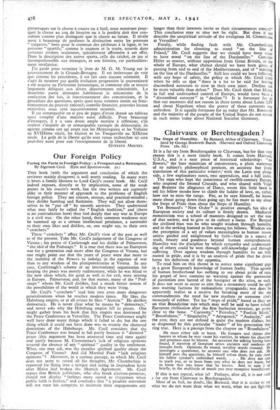Our Foreign Policy Facing the Facts in Foreign Policy :
a Prospect and a Retrospect. By Algernon Cecil. (Eyre and Spottiswoode. 5s.)
THIS book (with the argument and conclusion of which the reviewer mainly disagrees) is well worth reading. In many ways it bears a family likeness to Lord Cecil's recent book. Mr. Cecil indeed exposes, directly or by implication, some of the weak points in his cousin's work, but the two writers are curiously alike in their manner of approach to the problems of English foreign policy. They are sincere, serious, and practical-minded ; they dislike humbug and flashiness. They will not allow them- selves to be " put off " by smooth answers. They understand what may fairly be called the " English tradition," and (there is no contradiction here) they feel deeply that any war in Europe is a civil war.. On the other hand, their common weakness may be summed up as a certain intellectual petulance, a surrender to their own likes and dislikes, or, one might say, to their own " crotchets."
These " crotchets " affect Mr. Cecil's view of the past as well as of the present. Take Mr. Cecil's judgement of the Congress of Vienna ; his praise of Castlereagh and his dislike of Palmerston, " the idol of the Podsnaps." It is true that there was no European war for a generation and more after the Congress of Vienna, but one might point out that the years of peace were due more to the inability of the Powers to indulge in the expense of war than to any wisdom of the plenipotentiaries at Vienna. In any case, Castlereagh's scheme of an international organisation for keeping the peace was merely rudimentary, while he was blind to the new ideas which, for good as well as for evil, were stirring in Europe. Palmerston, and, for that matter, many of the " Pod- snaps " whom Mr. Cecil dislikes, had a much better notion of the possibilities of the world in which they were living.
Mr. Cecil's " crotchets " lead him into even more dangerous generalisations when he reaches modern times. He likes the Habsburg empire, or at all events he likes " Austria." He dislikes democracy. He is never clear what he means by " democracy," and never asks why the Habsburg empire fell to pieces. One might gather from his book that this empire was destroyed by the Peace Conference at Versailles. The Peace Conference might well have done many things which it failed to do, but the one thing which it could not have done was to reunite the shattered dominions of the Habsburgs. Mr. Cecil considers that the Peace Conference was bound to fail partly because it " dictated " peace (this argument has been answered time and time again) and partly because M. Clemenceau's lack of religious opinions assured the absence of any " spiritual " quality in the settlement.
What, one may ask, was the peculiar spiritual quality about the Congress of Vienna? And did Marshal Foch " lack religious opinions "? Moreover, in a curious passage, in which Mr. Cecil does not seem to reveal all his thoughts, Mr. Chamberlain is reproved for flying into a temper and acting in imprudent haste after Hitler had broken the Munich Agreement. Mr. Cecil argues that British politicians, who also break election-promises, should not display " feelings more suited to clergymen when public faith is broken," and concludes that " a prudent statesman will not trust his compeers to maintain their engagements any longer than their interests invite or their circumstances compel." This conclusion may or may not be right. But does it not describe the unspiritual attitude of the irreligious M. Clemencean at Versailles?
Finally, while finding fault with Mr. Chamberlain's administration for choosing to stand " on the line of Poland," Mr. Cecil suggests that we should have been wiser to have stood " on the line of the Dardanelles." Consider Hitler as master, without opposition from Great Britain, of the whole of Europe, what chance should we have been given of passing from end to end of the Mediterranean, and of " standing on the line of the Dardanelles." Still less could we have followed, with any hope of safety, the policy at which Mr. Cecil hints when he tells us ttiat " there is a lot to be said for leaving discomfited autocrats to stew in their own juice. Decline can be more valuable than defeat." Does Mr. Cecil think that Hitler, in full and undisturbed control of Europe, would have been a "discomfited autocrat" in " decline "? It is fortunate for us that our ancestors did not reason in these terms about Louis XIV and about Napoleon when the power of these autocrats was unbroken. It is equally fortunate for us today that Mr. Roosevelt and the majority of the people of the United States do not reason in such terms today about National Socialist Germany.






























 Previous page
Previous page